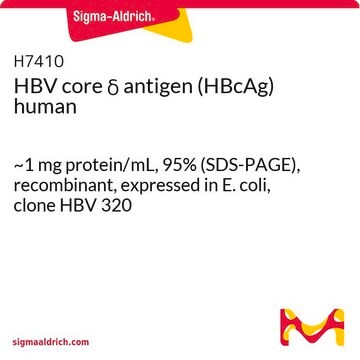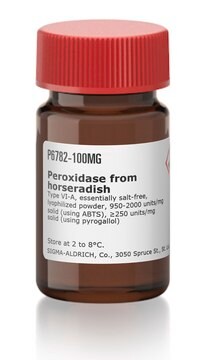H8909
HBcAg core human
~1 mg/mL, ≥95% (SDS-PAGE), recombinant, expressed in E. coli
Synonym(s):
Hepatitis B virus core antigen
Sign Into View Organizational & Contract Pricing
All Photos(1)
About This Item
Recommended Products
recombinant
expressed in E. coli
Quality Level
Assay
≥95% (SDS-PAGE)
mol wt
18 kDa
concentration
~1 mg/mL
UniProt accession no.
storage temp.
−20°C
Gene Information
hepatitis B virus ... HBVgp4(944568)
human ... HBVgp4(944568)
General description
amino acids 1-183 of HBV core antigen.
Biochem/physiol Actions
HBcAg core human is a capsid protein of hepatitis B virus (HBV). It acts as a viral factor for HBV clearance. HBcAg is implicated in viral replication.
Hepatitis B virus core antigen (HBcAg) is a positive control for human HBV antibodies.In humans with chronic HBV (hepatitis B virus) infection, cytotoxic effects of blood T lymphocytes can be suppressed by incubating cells with antibodies against hepatitis B core antigen (HBcAg). The antigen can also work as a T-cell independent antigen in athymic mice. However, it is an efficient immunogen, resulting in T-cell activation and increased anti-HBc levels. High cytoplasmic/membranous expression of HBcAg is associated with increased liver inflammation.
Physical form
Solution in 50% glycerol, 7.5 mM phosphate buffer, pH 7.2, 75 mM NaCl.
Storage Class Code
10 - Combustible liquids
WGK
WGK 1
Flash Point(F)
Not applicable
Flash Point(C)
Not applicable
Certificates of Analysis (COA)
Search for Certificates of Analysis (COA) by entering the products Lot/Batch Number. Lot and Batch Numbers can be found on a product’s label following the words ‘Lot’ or ‘Batch’.
Already Own This Product?
Find documentation for the products that you have recently purchased in the Document Library.
Hepatitis B virus nucleocapsid but not free core antigen controls viral clearance in mice
Lin YJ, et al.
Journal of Virology, 86(17), 9266-9273 (2012)
M Mondelli et al.
Journal of immunology (Baltimore, Md. : 1950), 129(6), 2773-2778 (1982-12-01)
Peripheral blood T lymphocytes from 21 patients with chronic HBV infection were incubated with autologous hepatocytes in a microcytotoxicity assay. Cytotoxicity was significantly increased in 13 cases, and in 12 of these the cytotoxic effect of the T lymphocytes was
Jun Hong et al.
Hepatology research : the official journal of the Japan Society of Hepatology, 38(4), 362-373 (2007-11-21)
This study was undertaken to investigate whether plasmacytoid dendritic cells (PDC) are involved in the generation of a higher proportion of CD4(+) and CD25(+) regulatory T (Treg) cells in chronic hepatitis B virus (HBV) infection compared with healthy patients. The
D R Milich et al.
Journal of immunology (Baltimore, Md. : 1950), 139(4), 1223-1231 (1987-08-15)
Hepatitis B virus nucleocapsid particles (HBcAg) can function as a T cell-independent antigen when injected into athymic mice. However, immunization of euthymic mice with HBcAg results in dramatically increased anti-HBc titers. Therefore we have examined the murine T cell response
J B Kurtz et al.
Journal of virological methods, 96(2), 127-132 (2001-07-11)
A measurable serological response to hepatitis C infection is delayed on average until 70 days after infection. In addition, it may not occur in some immunocompromised people. Detection of free hepatitis C (HCV) core antigen in blood has enabled diagnosis
Our team of scientists has experience in all areas of research including Life Science, Material Science, Chemical Synthesis, Chromatography, Analytical and many others.
Contact Technical Service




